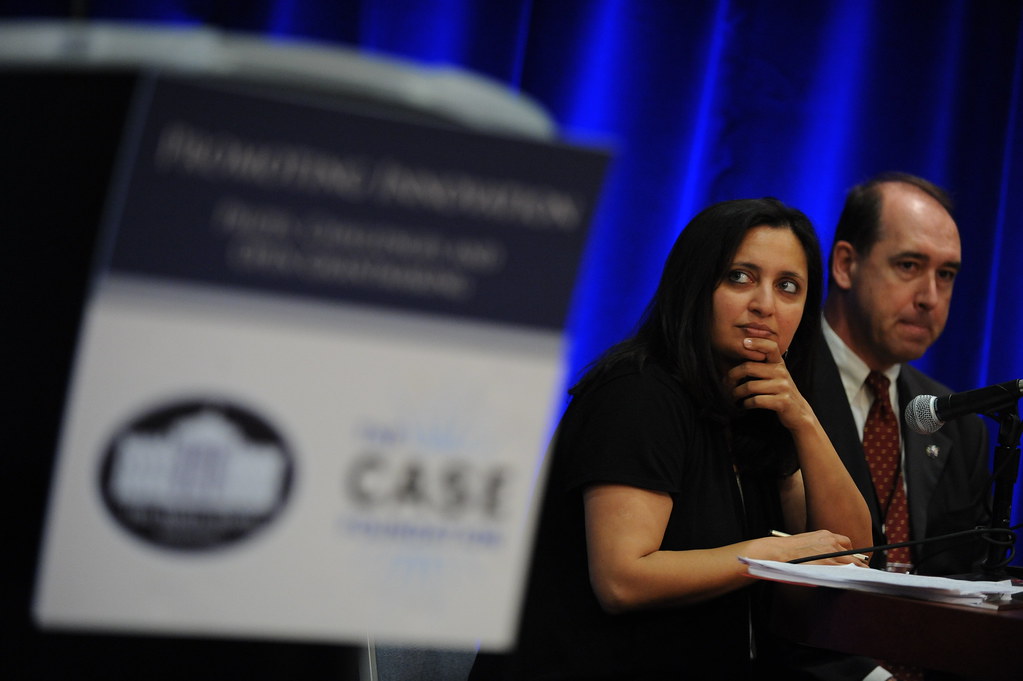Most of the media coverage of the joint Joe Biden-Bernie Sanders policy task forces, whose membership was announced on Wednesday, has focused on one of Sanders’ picks for the climate task force: Rep. Alexandria Ocasio-Cortez. That’s unsurprising. Since Sanders dropped out, perhaps no one is now a clearer symbol of progressive populism than the former bartender who brought down Joe Crowley. Ocasio-Cortez’s meteoric rise to superstardom and vocal opposition to business-as-usual politics is an inspiration to many, and an omen to the political and business establishment.
But of course, she’s not the only person on these task forces. And while there were excellent names announced from both Biden and Sanders, one other member of these task forces ought to be seen as a foil to Ocasio-Cortez. Indeed, this person’s career represents a near total distillation of the elite neoliberal consensus that ”AOC” and other populists oppose. That person is Sonal Shah, the one-time advisor to Pete Buttigieg who will sit on the economic policy task force.
Shah shows up early in one of the foundational texts of modern populism, Anand Giridharadas’ Winners Take All. The first chapter, loosely set in Georgetown University, mentions its Beeck Center For Social Impact And Innovation, “which was designed to promote the increasingly influential private-sector approach to world-changing,” Giridharadas writes. As the Beeck Center’s first executive director, Shah “had the perfect resume for it as a veteran of Google, Goldman Sachs, and the White House.” In government, she’d established an office that, according to its own website, “is based on a simple idea: we cannot drive lasting change by creating new top-down programs from Washington.”
Shah later explained her thinking more clearly in an essay for Forbes: while the government once addressed problems “from building the interstate highway system to the New Deal social programs … today’s challenges are more complicated and interconnected than ever before and cannot be solved by a single actor or solution.” As Giridharadas writes, “There was no mention of the fact that this method, by putting the moneyed into a leadership position on public problem-solving, gave them the power to thwart solutions that threatened them.”
And Shah’s record indicates clear cause for concern that she would do precisely that. While serving as Buttigieg’s policy director in 2019, Shah personally attended many high-dollar fundraisers with ultra-wealthy donors — the Buttigieg campaign even dropped all pretense and called these donors “investors.” Shah’s presence was often the main attraction trumpeted on invites: what CEO or wealthy heir wouldn’t want to catch the ear of the woman devising the policies of the would-be next President? It’s highly unusual for any policy aide, much less a policy director, to personally attend campaign fundraisers like this. The reason is obvious; it’s a corrupting influence that “wipes out the line between policymaking and solicitation of campaign contributions.”
Shah’s willingness to blur that line ought to raise alarm bells for both Biden’s campaign and Sanders’ allies. Biden has recently pivoted to a more populist tone, proclaiming that he wants a stimulus bill “a hell of a lot bigger” than $2 trillion and fulminating against Wall Street greed during the COVID-19 pandemic, saying “this is the second time we’ve bailed their asses out.” Yet Shah got her private-sector start as a Goldman Sachs Vice President advising on green investment opportunities — trying to meekly nudge Wall Street’s greed into hopefully socially productive venues, rather than curbing the banks’ power through a dreaded “top-down program from Washington.”
Yet Shah isn’t naive to the fact that corporate philanthropy and impact investing are bureaucratic and broken too, and that they serve private egos instead of a public democratic process. She even told Oxford University last October “I think philanthropy and social services become a very top-down process, [emphasis added] where we design our theory of change from the top without ever asking the people whom we serve whether the services are working for them. And yet we all mouth the words ‘bottom-up development’ and ‘bottom-up transformation.’ The tech community starts with ‘we do data-driven decision-making.’ But we never ask the poor what they need. Forget the poor — middle class! We never actually ask what they need, we tell them what we’re going to deliver.”
Giridharadas couldn’t have said it better himself. Yet Shah does not campaign against these elitist systems: she ran global development initiatives for Google.org, the search monopolist’s philanthropy arm. The Beeck Center’s issue “portfolios” have a heavy focus on digital programs, and you’d be hard-pressed to find an “insight” it publishes without words like “digital” or “tech.” The techies Shah criticized at Oxford were her bosses, her co-workers, and herself.
If Shah ends up inside the Biden executive branch, rest assured that she’ll do everything possible to hamper populist efforts at curbing private power, all for the sake of some potential bit of philanthropy that billionaires or corporations might deign to offer down the road. Hers is the exact opposite approach of the congresswoman whose policy director popularized the phrase “every billionaire is a policy failure.” If Biden sincerely wants to reach out to the populists who rally behind Ocasio-Cortez — and there’s every reason to believe his sincerity — then he can certainly find other centrist committee members besides Shah. Ocasio-Cortez and other young environmental activists will not accept a “Green New Public-Private Partnership.” Biden shouldn’t bother listening to someone who would.

